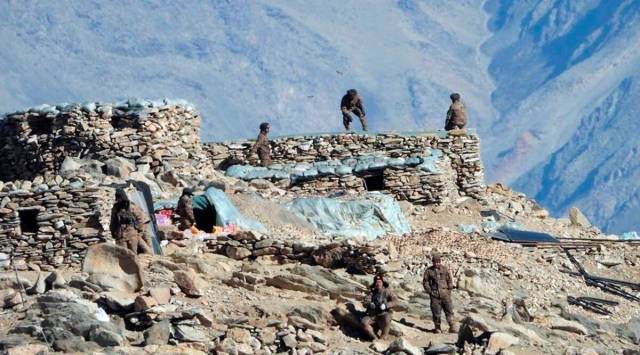A fortnight after they blamed each other for failing to make headway in talks over the military standoff on the Line of Actual Control in Ladakh, India Wednesday expressed “concern” over China’s new land boundary law, calling it a “unilateral” move that has implications on bilateral border agreements.
The Ministry of External Affairs’s official spokesperson Arindam Bagchi said India expects that China “will avoid action” under the pretext of this law, which could “unilaterally alter the situation” in border areas.

On October 23, the Standing Committee of the National People’s Congress, China’s ceremonial but top legislative body, passed the new law for “protection and exploitation of the country’s land border areas”, to come into effect from January 1.
The law asks the state to follow the principles of “equality, mutual trust, and friendly consultation, and handle land border related-affairs with neighbouring countries through negotiations to properly resolve disputes and longstanding border issues”.
New Delhi’s sharp response is similar to Beijing’s “concern” in August 2019 over India’s decision to revoke the special status of Jammu and Kashmir under Article 370.
It also comes almost a year-and-a-half into the unresolved border standoff between the two countries. China has resolved boundary disputes with all its neighbours, except India and Bhutan.
In Ladakh, troops have disengaged on the north and south banks of Pangong Tso and Gogra Post, but not at Hot Springs where they continue to face each other ever since the Chinese crossed the LAC in May 2020.
The Chinese have also been preventing Indian troops from accessing traditional patrolling points on the Depsang Plains, not far from the strategic Indian outpost at Daulat Beg Oldie near the Karakoram Pass in the north.
Story continues below this ad
“China’s unilateral decision to bring about a legislation, which can have implications on our existing bilateral arrangements on border management as well as on the boundary question, is of concern to us,” the MEA spokesperson said.
Detailing India’s position, the spokesperson said: “Such a unilateral move will have no bearing on the arrangements that both sides have already reached earlier, whether it is on the Boundary Question or for maintaining peace and tranquility along the LAC in India-China Border areas. We also expect that China will avoid undertaking action, under the pretext of this law, which could unilaterally alter the situation in the India-China border areas.”
He said: “China’s law also states among other things that China abides by treaties concluded with or jointly acceded to by foreign countries on land boundary affairs. It also has provisions to carry out reorganisation of districts in the border areas.”
Underlining that India and China “have still not resolved the boundary question”, the MEA said that both sides have agreed to seek a “fair, reasonable and mutually acceptable” resolution through consultations “on an equal footing”.
Story continues below this ad
They have also concluded several bilateral agreements, protocols and arrangements to maintain peace along the LAC in the interim, the spokesperson said.
New Delhi also reminded Beijing that “the passage of this new law does not in our view confer any legitimacy to the so-called China Pakistan “Boundary Agreement” of 1963 which the Government of India has consistently maintained is an illegal and invalid agreement”. India maintains that under this agreement, Pakistan illegally ceded 5,180 km of Indian territory in Pakistan-occupied Kashmir to China.
In August 2019, after India decided to abrogate Article 370, China had expressed “serious concern” and said that “the parties concerned should exercise restraint and act with caution, especially to avoid actions that unilaterally change the status quo and exacerbate the tension”.
In its response, the MEA had said that “India does not comment on the internal affairs of other countries and similarly expects other countries to do likewise”.









